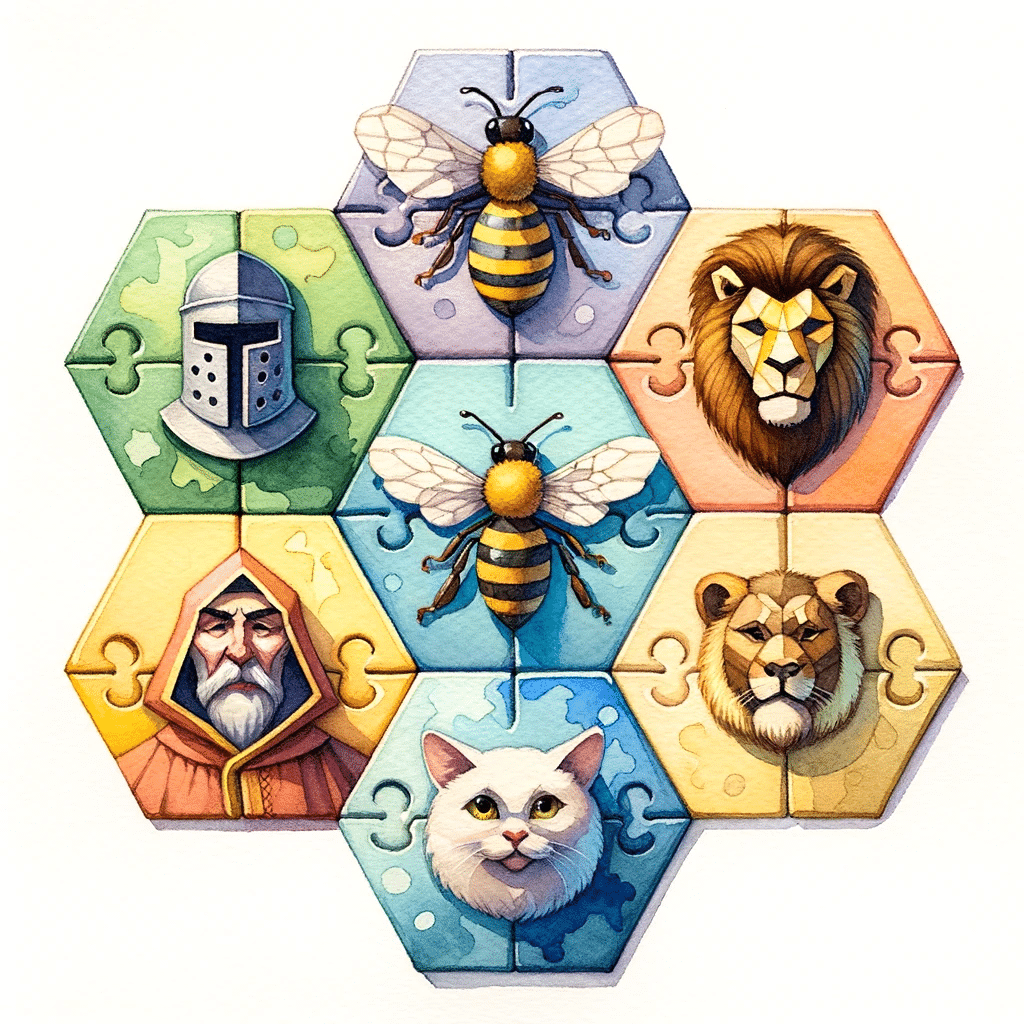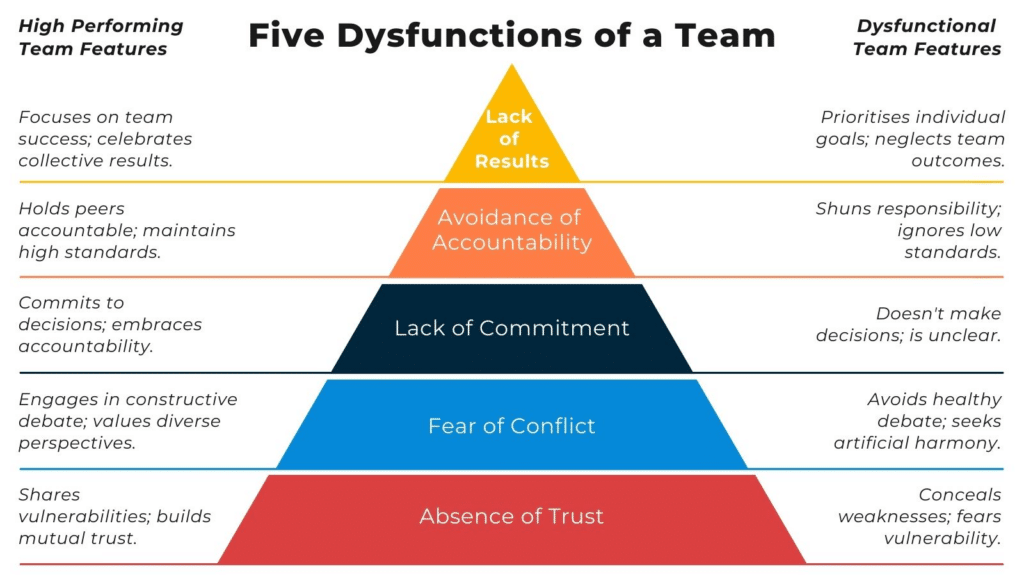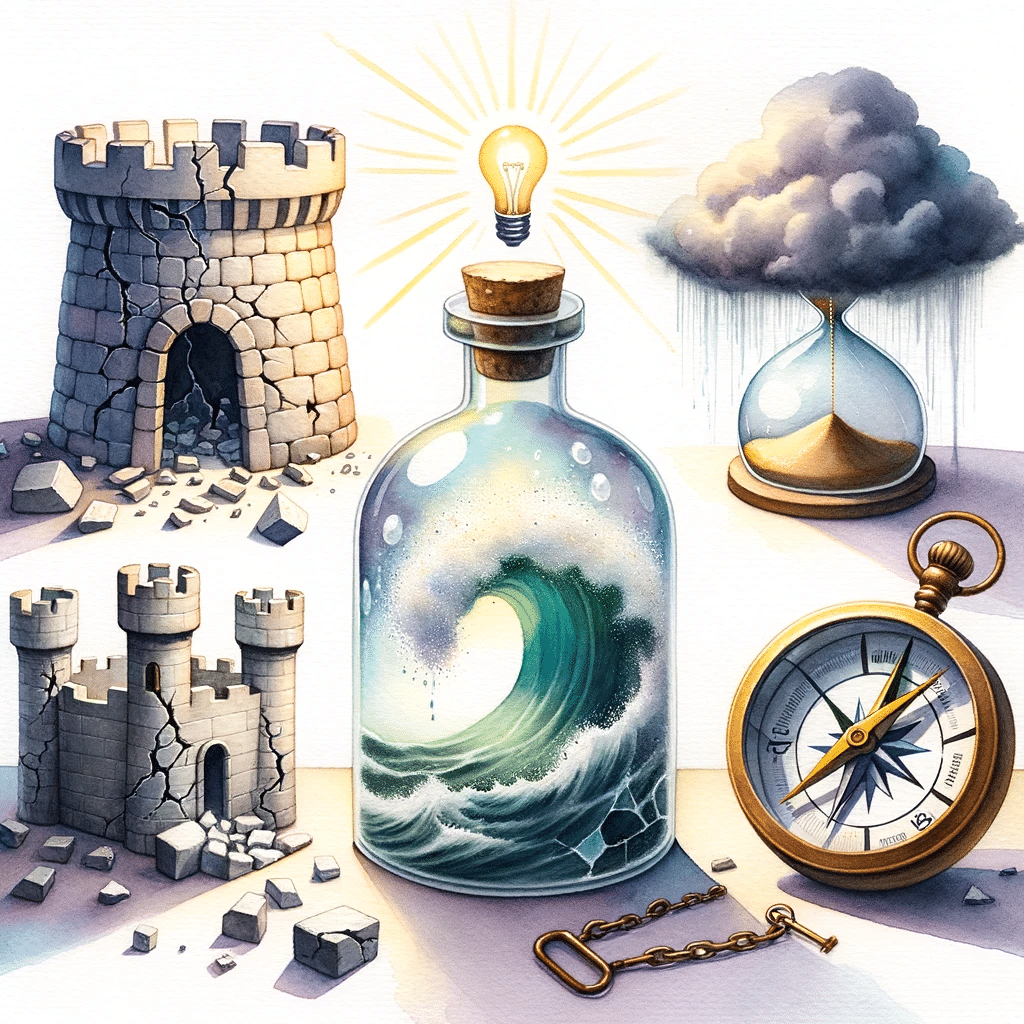Psychology
INTERNAL ECOLOGY AND MANAGEMENT
Workshop principle
The workshop aims to conduct a multi-faceted exploration of self-awareness and team dynamics, combining elements of individual and collective psychology. Three main frameworks are used:
- The “5 wounds” that shape us
- The “6 PCM profiles” (Process Comm) that describe our ways of communicating
- The “5 dysfunctions” that hinder a team’s effectiveness.
Participants are encouraged to engage in personal reflection and open discussion to better understand their strengths, challenges, and role within their team.
Educational objectives:
- Increase self-awareness: Participants should leave the workshop with a deeper understanding of their own “wounds”, limiting beliefs, and communication style (PCM profile).
- Improve team understanding: By exploring the “5 dysfunctions of a team”, participants will gain better insight into team dynamics and potential obstacles to team effectiveness.
- Encourage positive change: Each participant will be encouraged to identify specific actions they can take to work on the wounds, limiting beliefs, or team dysfunctions identified during the workshop.
In doing so, this workshop offers a combined approach, aiming to improve individual and collective functioning, in both an introspective and collaborative manner.
The 5 wounds that prevent us from being ourselves
The 5 wounds model is a psychological approach introduced by psychotherapist Lise Bourbeau in her book “The 5 Wounds That Prevent You from Being Yourself”. According to her, throughout our lives, we experience emotional wounds that can have a profound impact on our behavior and relationships.
Awareness of these wounds can help understand some of our reactions and behaviors, and can be a first step towards healing and personal development. However, it is important to remember that this model is just one way among others to approach human psychology and that each individual is unique in their history and experiences.
The five wounds identified by Bourbeau are:
![{"type":"elementor","siteurl":"https://tomorrowtheory.com/wp-json/","elements":[{"id":"dae6a3c","elType":"widget","isInner":false,"isLocked":false,"settings":{"image":{"id":1735,"url":"http://ttlieqo.cluster027.hosting.ovh.net/wp-content/uploads/2023/08/Gen-Z.png","alt":"","source":"library"},"image_size":"full","image_border_radius":{"unit":"px","top":"400","right":"200","bottom":"400","left":"400","isLinked":""},"image_box_shadow_box_shadow_type":"yes","image_box_shadow_box_shadow":{"horizontal":"0","vertical":"0","blur":"30","spread":"0","color":"rgba(0,0,0,0.12)"},"_margin":{"unit":"%","top":"-10","right":"0","bottom":"0","left":"0","isLinked":""},"_element_custom_width":{"unit":"px","size":384.016},"_offset_x":{"size":"0","unit":"px"},"_offset_y":{"size":"0","unit":"px"},"_margin_tablet":{"unit":"%","top":"","right":"","bottom":"","left":"","isLinked":"1"},"_margin_mobile":{"unit":"%","top":"0","right":"0","bottom":"0","left":"0","isLinked":"1"},"align_tablet":"center","width_tablet":{"unit":"%","size":"50","sizes":[]},"width_mobile":{"unit":"%","size":"100","sizes":[]},"motion_fx_motion_fx_scrolling":"yes","motion_fx_translateY_effect":"yes","motion_fx_translateY_speed":{"unit":"px","size":"1","sizes":[]},"pa_condition_repeater":[],"image_custom_dimension":{"width":"","height":""},"align":"","align_mobile":"","caption_source":"none","caption":"","link_to":"none","link":{"url":"","is_external":"","nofollow":"","custom_attributes":""},"open_lightbox":"default","view":"traditional","width":{"unit":"%","size":"","sizes":[]},"space":{"unit":"%","size":"","sizes":[]},"space_tablet":{"unit":"%","size":"","sizes":[]},"space_mobile":{"unit":"%","size":"","sizes":[]},"height":{"unit":"px","size":"","sizes":[]},"height_tablet":{"unit":"px","size":"","sizes":[]},"height_mobile":{"unit":"px","size":"","sizes":[]},"object-fit":"","object-fit_tablet":"","object-fit_mobile":"","object-position":"center center","object-position_tablet":"","object-position_mobile":"","opacity":{"unit":"px","size":"","sizes":[]},"css_filters_css_filter":"","css_filters_blur":{"unit":"px","size":0,"sizes":[]},"css_filters_brightness":{"unit":"px","size":100,"sizes":[]},"css_filters_contrast":{"unit":"px","size":100,"sizes":[]},"css_filters_saturate":{"unit":"px","size":100,"sizes":[]},"css_filters_hue":{"unit":"px","size":0,"sizes":[]},"opacity_hover":{"unit":"px","size":"","sizes":[]},"css_filters_hover_css_filter":"","css_filters_hover_blur":{"unit":"px","size":0,"sizes":[]},"css_filters_hover_brightness":{"unit":"px","size":100,"sizes":[]},"css_filters_hover_contrast":{"unit":"px","size":100,"sizes":[]},"css_filters_hover_saturate":{"unit":"px","size":100,"sizes":[]},"css_filters_hover_hue":{"unit":"px","size":0,"sizes":[]},"background_hover_transition":{"unit":"px","size":"","sizes":[]},"hover_animation":"","image_border_border":"","image_border_width":{"unit":"px","top":"","right":"","bottom":"","left":"","isLinked":true},"image_border_width_tablet":{"unit":"px","top":"","right":"","bottom":"","left":"","isLinked":true},"image_border_width_mobile":{"unit":"px","top":"","right":"","bottom":"","left":"","isLinked":true},"image_border_color":"","image_border_radius_tablet":{"unit":"px","top":"","right":"","bottom":"","left":"","isLinked":true},"image_border_radius_mobile":{"unit":"px","top":"","right":"","bottom":"","left":"","isLinked":true},"caption_align":"","caption_align_tablet":"","caption_align_mobile":"","text_color":"","caption_background_color":"","caption_typography_typography":"","caption_typography_font_family":"","caption_typography_font_size":{"unit":"px","size":"","sizes":[]},"caption_typography_font_size_tablet":{"unit":"px","size":"","sizes":[]},"caption_typography_font_size_mobile":{"unit":"px","size":"","sizes":[]},"caption_typography_font_weight":"","caption_typography_text_transform":"","caption_typography_font_style":"","caption_typography_text_decoration":"","caption_typography_line_height":{"unit":"px","size":"","sizes":[]},"caption_typography_line_height_tablet":{"unit":"em","size":"","sizes":[]},"caption_typography_line_height_mobile":{"unit":"em","size":"","sizes":[]},"caption_typography_letter_spacing":{"unit":"px","size":"","sizes":[]},"caption_typography_letter_spacing_tablet":{"unit":"px","size":"","sizes":[]},"caption_typography_letter_spacing_mobile":{"unit":"px","size":"","sizes":[]},"caption_typography_word_spacing":{"unit":"px","size":"","sizes":[]},"caption_typography_word_spacing_tablet":{"unit":"em","size":"","sizes":[]},"caption_typography_word_spacing_mobile":{"unit":"em","size":"","sizes":[]},"caption_text_shadow_text_shadow_type":"","caption_text_shadow_text_shadow":{"horizontal":0,"vertical":0,"blur":10,"color":"rgba(0,0,0,0.3)"},"caption_space":{"unit":"px","size":"","sizes":[]},"caption_space_tablet":{"unit":"px","size":"","sizes":[]},"caption_space_mobile":{"unit":"px","size":"","sizes":[]},"_title":"","_padding":{"unit":"px","top":"","right":"","bottom":"","left":"","isLinked":true},"_padding_tablet":{"unit":"px","top":"","right":"","bottom":"","left":"","isLinked":true},"_padding_mobile":{"unit":"px","top":"","right":"","bottom":"","left":"","isLinked":true},"_element_width":"initial","_element_width_tablet":"","_element_width_mobile":"","_element_custom_width_tablet":{"unit":"px","size":"","sizes":[]},"_element_custom_width_mobile":{"unit":"px","size":"","sizes":[]},"_flex_align_self":"","_flex_align_self_tablet":"","_flex_align_self_mobile":"","_flex_order":"","_flex_order_tablet":"","_flex_order_mobile":"","_flex_order_custom":"","_flex_order_custom_tablet":"","_flex_order_custom_mobile":"","_flex_size":"none","_flex_size_tablet":"","_flex_size_mobile":"","_flex_grow":1,"_flex_grow_tablet":"","_flex_grow_mobile":"","_flex_shrink":1,"_flex_shrink_tablet":"","_flex_shrink_mobile":"","_element_vertical_align":"","_element_vertical_align_tablet":"","_element_vertical_align_mobile":"","_position":"","_offset_orientation_h":"start","_offset_x_tablet":{"unit":"px","size":"","sizes":[]},"_offset_x_mobile":{"unit":"px","size":"","sizes":[]},"_offset_x_end":{"unit":"px","size":"0","sizes":[]},"_offset_x_end_tablet":{"unit":"px","size":"","sizes":[]},"_offset_x_end_mobile":{"unit":"px","size":"","sizes":[]},"_offset_orientation_v":"start","_offset_y_tablet":{"unit":"px","size":"","sizes":[]},"_offset_y_mobile":{"unit":"px","size":"","sizes":[]},"_offset_y_end":{"unit":"px","size":"0","sizes":[]},"_offset_y_end_tablet":{"unit":"px","size":"","sizes":[]},"_offset_y_end_mobile":{"unit":"px","size":"","sizes":[]},"_z_index":"","_z_index_tablet":"","_z_index_mobile":"","_element_id":"","_css_classes":"","cpel_lv_enabled":"","cpel_lv_action":"show","cpel_lv_languages":[],"pa_display_conditions_switcher":"","pa_display_action":"show","pa_display_when":"any","premium_fe_switcher":"","premium_fe_target":"","premium_fe_translate_switcher":"","premium_fe_Xtranslate":{"unit":"px","size":"","sizes":{"from":0,"to":5}},"premium_fe_Xtranslate_tablet":{"unit":"px","size":"","sizes":[]},"premium_fe_Xtranslate_mobile":{"unit":"px","size":"","sizes":[]},"premium_fe_Ytranslate":{"unit":"px","size":"","sizes":{"from":0,"to":5}},"premium_fe_Ytranslate_tablet":{"unit":"px","size":"","sizes":[]},"premium_fe_Ytranslate_mobile":{"unit":"px","size":"","sizes":[]},"premium_fe_trans_duration":{"unit":"px","size":1000,"sizes":[]},"premium_fe_trans_delay":{"unit":"px","size":"","sizes":[]},"premium_fe_rotate_switcher":"","premium_fe_Xrotate":{"unit":"deg","size":"","sizes":{"from":0,"to":45}},"premium_fe_Xrotate_tablet":{"unit":"px","size":"","sizes":[]},"premium_fe_Xrotate_mobile":{"unit":"px","size":"","sizes":[]},"premium_fe_Yrotate":{"unit":"deg","size":"","sizes":{"from":0,"to":45}},"premium_fe_Yrotate_tablet":{"unit":"px","size":"","sizes":[]},"premium_fe_Yrotate_mobile":{"unit":"px","size":"","sizes":[]},"premium_fe_Zrotate":{"unit":"deg","size":"","sizes":{"from":0,"to":45}},"premium_fe_Zrotate_tablet":{"unit":"px","size":"","sizes":[]},"premium_fe_Zrotate_mobile":{"unit":"px","size":"","sizes":[]},"premium_fe_rotate_duration":{"unit":"px","size":1000,"sizes":[]},"premium_fe_rotate_delay":{"unit":"px","size":"","sizes":[]},"premium_fe_scale_switcher":"","premium_fe_Xscale":{"unit":"px","size":"","sizes":{"from":1,"to":1.2}},"premium_fe_Xscale_tablet":{"unit":"px","size":"","sizes":[]},"premium_fe_Xscale_mobile":{"unit":"px","size":"","sizes":[]},"premium_fe_Yscale":{"unit":"px","size":"","sizes":{"from":1,"to":1.2}},"premium_fe_Yscale_tablet":{"unit":"px","size":"","sizes":[]},"premium_fe_Yscale_mobile":{"unit":"px","size":"","sizes":[]},"premium_fe_scale_duration":{"unit":"px","size":1000,"sizes":[]},"premium_fe_scale_delay":{"unit":"px","size":"","sizes":[]},"premium_fe_skew_switcher":"","premium_fe_Xskew":{"unit":"deg","size":"","sizes":{"from":0,"to":20}},"premium_fe_Xskew_tablet":{"unit":"px","size":"","sizes":[]},"premium_fe_Xskew_mobile":{"unit":"px","size":"","sizes":[]},"premium_fe_Yskew":{"unit":"deg","size":"","sizes":{"from":0,"to":20}},"premium_fe_Yskew_tablet":{"unit":"px","size":"","sizes":[]},"premium_fe_Yskew_mobile":{"unit":"px","size":"","sizes":[]},"premium_fe_skew_duration":{"unit":"px","size":1000,"sizes":[]},"premium_fe_skew_delay":{"unit":"px","size":"","sizes":[]},"premium_fe_opacity_switcher":"","premium_fe_bg_color_switcher":"","premium_fe_blur_switcher":"","premium_fe_contrast_switcher":"","premium_fe_gScale_switcher":"","premium_fe_hue_switcher":"","premium_fe_brightness_switcher":"","premium_fe_saturate_switcher":"","premium_fe_direction":"alternate","premium_fe_loop":"default","premium_fe_loop_number":3,"premium_fe_easing":"easeInOutSine","premium_fe_ease_step":5,"premium_fe_disable_safari":"","motion_fx_translateY_direction":"","motion_fx_translateY_affectedRange":{"unit":"%","size":"","sizes":{"start":0,"end":100}},"motion_fx_translateX_effect":"","motion_fx_translateX_direction":"","motion_fx_translateX_speed":{"unit":"px","size":4,"sizes":[]},"motion_fx_translateX_affectedRange":{"unit":"%","size":"","sizes":{"start":0,"end":100}},"motion_fx_opacity_effect":"","motion_fx_opacity_direction":"out-in","motion_fx_opacity_level":{"unit":"px","size":10,"sizes":[]},"motion_fx_opacity_range":{"unit":"%","size":"","sizes":{"start":20,"end":80}},"motion_fx_blur_effect":"","motion_fx_blur_direction":"out-in","motion_fx_blur_level":{"unit":"px","size":7,"sizes":[]},"motion_fx_blur_range":{"unit":"%","size":"","sizes":{"start":20,"end":80}},"motion_fx_rotateZ_effect":"","motion_fx_rotateZ_direction":"","motion_fx_rotateZ_speed":{"unit":"px","size":1,"sizes":[]},"motion_fx_rotateZ_affectedRange":{"unit":"%","size":"","sizes":{"start":0,"end":100}},"motion_fx_scale_effect":"","motion_fx_scale_direction":"out-in","motion_fx_scale_speed":{"unit":"px","size":4,"sizes":[]},"motion_fx_scale_range":{"unit":"%","size":"","sizes":{"start":20,"end":80}},"motion_fx_transform_origin_x":"center","motion_fx_transform_origin_y":"center","motion_fx_devices":["desktop","tablet","mobile"],"motion_fx_range":"","motion_fx_motion_fx_mouse":"","motion_fx_mouseTrack_effect":"","motion_fx_mouseTrack_direction":"","motion_fx_mouseTrack_speed":{"unit":"px","size":1,"sizes":[]},"motion_fx_tilt_effect":"","motion_fx_tilt_direction":"","motion_fx_tilt_speed":{"unit":"px","size":4,"sizes":[]},"sticky":"","sticky_on":["desktop","tablet","mobile"],"sticky_offset":0,"sticky_offset_tablet":"","sticky_offset_mobile":"","sticky_effects_offset":0,"sticky_effects_offset_tablet":"","sticky_effects_offset_mobile":"","sticky_parent":"","_animation":"","_animation_tablet":"","_animation_mobile":"","animation_duration":"","_animation_delay":"","_transform_rotate_popover":"","_transform_rotateZ_effect":{"unit":"px","size":"","sizes":[]},"_transform_rotateZ_effect_tablet":{"unit":"deg","size":"","sizes":[]},"_transform_rotateZ_effect_mobile":{"unit":"deg","size":"","sizes":[]},"_transform_rotate_3d":"","_transform_rotateX_effect":{"unit":"px","size":"","sizes":[]},"_transform_rotateX_effect_tablet":{"unit":"deg","size":"","sizes":[]},"_transform_rotateX_effect_mobile":{"unit":"deg","size":"","sizes":[]},"_transform_rotateY_effect":{"unit":"px","size":"","sizes":[]},"_transform_rotateY_effect_tablet":{"unit":"deg","size":"","sizes":[]},"_transform_rotateY_effect_mobile":{"unit":"deg","size":"","sizes":[]},"_transform_perspective_effect":{"unit":"px","size":"","sizes":[]},"_transform_perspective_effect_tablet":{"unit":"px","size":"","sizes":[]},"_transform_perspective_effect_mobile":{"unit":"px","size":"","sizes":[]},"_transform_translate_popover":"","_transform_translateX_effect":{"unit":"px","size":"","sizes":[]},"_transform_translateX_effect_tablet":{"unit":"px","size":"","sizes":[]},"_transform_translateX_effect_mobile":{"unit":"px","size":"","sizes":[]},"_transform_translateY_effect":{"unit":"px","size":"","sizes":[]},"_transform_translateY_effect_tablet":{"unit":"px","size":"","sizes":[]},"_transform_translateY_effect_mobile":{"unit":"px","size":"","sizes":[]},"_transform_scale_popover":"","_transform_keep_proportions":"yes","_transform_scale_effect":{"unit":"px","size":"","sizes":[]},"_transform_scale_effect_tablet":{"unit":"px","size":"","sizes":[]},"_transform_scale_effect_mobile":{"unit":"px","size":"","sizes":[]},"_transform_scaleX_effect":{"unit":"px","size":"","sizes":[]},"_transform_scaleX_effect_tablet":{"unit":"px","size":"","sizes":[]},"_transform_scaleX_effect_mobile":{"unit":"px","size":"","sizes":[]},"_transform_scaleY_effect":{"unit":"px","size":"","sizes":[]},"_transform_scaleY_effect_tablet":{"unit":"px","size":"","sizes":[]},"_transform_scaleY_effect_mobile":{"unit":"px","size":"","sizes":[]},"_transform_skew_popover":"","_transform_skewX_effect":{"unit":"px","size":"","sizes":[]},"_transform_skewX_effect_tablet":{"unit":"deg","size":"","sizes":[]},"_transform_skewX_effect_mobile":{"unit":"deg","size":"","sizes":[]},"_transform_skewY_effect":{"unit":"px","size":"","sizes":[]},"_transform_skewY_effect_tablet":{"unit":"deg","size":"","sizes":[]},"_transform_skewY_effect_mobile":{"unit":"deg","size":"","sizes":[]},"_transform_flipX_effect":"","_transform_flipY_effect":"","_transform_rotate_popover_hover":"","_transform_rotateZ_effect_hover":{"unit":"px","size":"","sizes":[]},"_transform_rotateZ_effect_hover_tablet":{"unit":"deg","size":"","sizes":[]},"_transform_rotateZ_effect_hover_mobile":{"unit":"deg","size":"","sizes":[]},"_transform_rotate_3d_hover":"","_transform_rotateX_effect_hover":{"unit":"px","size":"","sizes":[]},"_transform_rotateX_effect_hover_tablet":{"unit":"deg","size":"","sizes":[]},"_transform_rotateX_effect_hover_mobile":{"unit":"deg","size":"","sizes":[]},"_transform_rotateY_effect_hover":{"unit":"px","size":"","sizes":[]},"_transform_rotateY_effect_hover_tablet":{"unit":"deg","size":"","sizes":[]},"_transform_rotateY_effect_hover_mobile":{"unit":"deg","size":"","sizes":[]},"_transform_perspective_effect_hover":{"unit":"px","size":"","sizes":[]},"_transform_perspective_effect_hover_tablet":{"unit":"px","size":"","sizes":[]},"_transform_perspective_effect_hover_mobile":{"unit":"px","size":"","sizes":[]},"_transform_translate_popover_hover":"","_transform_translateX_effect_hover":{"unit":"px","size":"","sizes":[]},"_transform_translateX_effect_hover_tablet":{"unit":"px","size":"","sizes":[]},"_transform_translateX_effect_hover_mobile":{"unit":"px","size":"","sizes":[]},"_transform_translateY_effect_hover":{"unit":"px","size":"","sizes":[]},"_transform_translateY_effect_hover_tablet":{"unit":"px","size":"","sizes":[]},"_transform_translateY_effect_hover_mobile":{"unit":"px","size":"","sizes":[]},"_transform_scale_popover_hover":"","_transform_keep_proportions_hover":"yes","_transform_scale_effect_hover":{"unit":"px","size":"","sizes":[]},"_transform_scale_effect_hover_tablet":{"unit":"px","size":"","sizes":[]},"_transform_scale_effect_hover_mobile":{"unit":"px","size":"","sizes":[]},"_transform_scaleX_effect_hover":{"unit":"px","size":"","sizes":[]},"_transform_scaleX_effect_hover_tablet":{"unit":"px","size":"","sizes":[]},"_transform_scaleX_effect_hover_mobile":{"unit":"px","size":"","sizes":[]},"_transform_scaleY_effect_hover":{"unit":"px","size":"","sizes":[]},"_transform_scaleY_effect_hover_tablet":{"unit":"px","size":"","sizes":[]},"_transform_scaleY_effect_hover_mobile":{"unit":"px","size":"","sizes":[]},"_transform_skew_popover_hover":"","_transform_skewX_effect_hover":{"unit":"px","size":"","sizes":[]},"_transform_skewX_effect_hover_tablet":{"unit":"deg","size":"","sizes":[]},"_transform_skewX_effect_hover_mobile":{"unit":"deg","size":"","sizes":[]},"_transform_skewY_effect_hover":{"unit":"px","size":"","sizes":[]},"_transform_skewY_effect_hover_tablet":{"unit":"deg","size":"","sizes":[]},"_transform_skewY_effect_hover_mobile":{"unit":"deg","size":"","sizes":[]},"_transform_flipX_effect_hover":"","_transform_flipY_effect_hover":"","_transform_transition_hover":{"unit":"px","size":"","sizes":[]},"motion_fx_transform_x_anchor_point":"","motion_fx_transform_x_anchor_point_tablet":"","motion_fx_transform_x_anchor_point_mobile":"","motion_fx_transform_y_anchor_point":"","motion_fx_transform_y_anchor_point_tablet":"","motion_fx_transform_y_anchor_point_mobile":"","_background_background":"","_background_color":"","_background_color_stop":{"unit":"%","size":0,"sizes":[]},"_background_color_b":"#f2295b","_background_color_b_stop":{"unit":"%","size":100,"sizes":[]},"_background_gradient_type":"linear","_background_gradient_angle":{"unit":"deg","size":180,"sizes":[]},"_background_gradient_position":"center center","_background_image":{"url":"","id":"","size":""},"_background_image_tablet":{"url":"","id":"","size":""},"_background_image_mobile":{"url":"","id":"","size":""},"_background_position":"","_background_position_tablet":"","_background_position_mobile":"","_background_xpos":{"unit":"px","size":0,"sizes":[]},"_background_xpos_tablet":{"unit":"px","size":0,"sizes":[]},"_background_xpos_mobile":{"unit":"px","size":0,"sizes":[]},"_background_ypos":{"unit":"px","size":0,"sizes":[]},"_background_ypos_tablet":{"unit":"px","size":0,"sizes":[]},"_background_ypos_mobile":{"unit":"px","size":0,"sizes":[]},"_background_attachment":"","_background_repeat":"","_background_repeat_tablet":"","_background_repeat_mobile":"","_background_size":"","_background_size_tablet":"","_background_size_mobile":"","_background_bg_width":{"unit":"%","size":100,"sizes":[]},"_background_bg_width_tablet":{"unit":"px","size":"","sizes":[]},"_background_bg_width_mobile":{"unit":"px","size":"","sizes":[]},"_background_video_link":"","_background_video_start":"","_background_video_end":"","_background_play_once":"","_background_play_on_mobile":"","_background_privacy_mode":"","_background_video_fallback":{"url":"","id":"","size":""},"_background_slideshow_gallery":[],"_background_slideshow_loop":"yes","_background_slideshow_slide_duration":5000,"_background_slideshow_slide_transition":"fade","_background_slideshow_transition_duration":500,"_background_slideshow_background_size":"","_background_slideshow_background_size_tablet":"","_background_slideshow_background_size_mobile":"","_background_slideshow_background_position":"","_background_slideshow_background_position_tablet":"","_background_slideshow_background_position_mobile":"","_background_slideshow_lazyload":"","_background_slideshow_ken_burns":"","_background_slideshow_ken_burns_zoom_direction":"in","_background_hover_background":"","_background_hover_color":"","_background_hover_color_stop":{"unit":"%","size":0,"sizes":[]},"_background_hover_color_b":"#f2295b","_background_hover_color_b_stop":{"unit":"%","size":100,"sizes":[]},"_background_hover_gradient_type":"linear","_background_hover_gradient_angle":{"unit":"deg","size":180,"sizes":[]},"_background_hover_gradient_position":"center center","_background_hover_image":{"url":"","id":"","size":""},"_background_hover_image_tablet":{"url":"","id":"","size":""},"_background_hover_image_mobile":{"url":"","id":"","size":""},"_background_hover_position":"","_background_hover_position_tablet":"","_background_hover_position_mobile":"","_background_hover_xpos":{"unit":"px","size":0,"sizes":[]},"_background_hover_xpos_tablet":{"unit":"px","size":0,"sizes":[]},"_background_hover_xpos_mobile":{"unit":"px","size":0,"sizes":[]},"_background_hover_ypos":{"unit":"px","size":0,"sizes":[]},"_background_hover_ypos_tablet":{"unit":"px","size":0,"sizes":[]},"_background_hover_ypos_mobile":{"unit":"px","size":0,"sizes":[]},"_background_hover_attachment":"","_background_hover_repeat":"","_background_hover_repeat_tablet":"","_background_hover_repeat_mobile":"","_background_hover_size":"","_background_hover_size_tablet":"","_background_hover_size_mobile":"","_background_hover_bg_width":{"unit":"%","size":100,"sizes":[]},"_background_hover_bg_width_tablet":{"unit":"px","size":"","sizes":[]},"_background_hover_bg_width_mobile":{"unit":"px","size":"","sizes":[]},"_background_hover_video_link":"","_background_hover_video_start":"","_background_hover_video_end":"","_background_hover_play_once":"","_background_hover_play_on_mobile":"","_background_hover_privacy_mode":"","_background_hover_video_fallback":{"url":"","id":"","size":""},"_background_hover_slideshow_gallery":[],"_background_hover_slideshow_loop":"yes","_background_hover_slideshow_slide_duration":5000,"_background_hover_slideshow_slide_transition":"fade","_background_hover_slideshow_transition_duration":500,"_background_hover_slideshow_background_size":"","_background_hover_slideshow_background_size_tablet":"","_background_hover_slideshow_background_size_mobile":"","_background_hover_slideshow_background_position":"","_background_hover_slideshow_background_position_tablet":"","_background_hover_slideshow_background_position_mobile":"","_background_hover_slideshow_lazyload":"","_background_hover_slideshow_ken_burns":"","_background_hover_slideshow_ken_burns_zoom_direction":"in","_background_hover_transition":{"unit":"px","size":"","sizes":[]},"_border_border":"","_border_width":{"unit":"px","top":"","right":"","bottom":"","left":"","isLinked":true},"_border_width_tablet":{"unit":"px","top":"","right":"","bottom":"","left":"","isLinked":true},"_border_width_mobile":{"unit":"px","top":"","right":"","bottom":"","left":"","isLinked":true},"_border_color":"","_border_radius":{"unit":"px","top":"","right":"","bottom":"","left":"","isLinked":true},"_border_radius_tablet":{"unit":"px","top":"","right":"","bottom":"","left":"","isLinked":true},"_border_radius_mobile":{"unit":"px","top":"","right":"","bottom":"","left":"","isLinked":true},"_box_shadow_box_shadow_type":"","_box_shadow_box_shadow":{"horizontal":0,"vertical":0,"blur":10,"spread":0,"color":"rgba(0,0,0,0.5)"},"_box_shadow_box_shadow_position":" ","_border_hover_border":"","_border_hover_width":{"unit":"px","top":"","right":"","bottom":"","left":"","isLinked":true},"_border_hover_width_tablet":{"unit":"px","top":"","right":"","bottom":"","left":"","isLinked":true},"_border_hover_width_mobile":{"unit":"px","top":"","right":"","bottom":"","left":"","isLinked":true},"_border_hover_color":"","_border_radius_hover":{"unit":"px","top":"","right":"","bottom":"","left":"","isLinked":true},"_border_radius_hover_tablet":{"unit":"px","top":"","right":"","bottom":"","left":"","isLinked":true},"_border_radius_hover_mobile":{"unit":"px","top":"","right":"","bottom":"","left":"","isLinked":true},"_box_shadow_hover_box_shadow_type":"","_box_shadow_hover_box_shadow":{"horizontal":0,"vertical":0,"blur":10,"spread":0,"color":"rgba(0,0,0,0.5)"},"_box_shadow_hover_box_shadow_position":" ","_border_hover_transition":{"unit":"px","size":"","sizes":[]},"_mask_switch":"","_mask_shape":"circle","_mask_image":{"url":"","id":"","size":""},"_mask_notice":"","_mask_size":"contain","_mask_size_tablet":"","_mask_size_mobile":"","_mask_size_scale":{"unit":"%","size":100,"sizes":[]},"_mask_size_scale_tablet":{"unit":"px","size":"","sizes":[]},"_mask_size_scale_mobile":{"unit":"px","size":"","sizes":[]},"_mask_position":"center center","_mask_position_tablet":"","_mask_position_mobile":"","_mask_position_x":{"unit":"%","size":0,"sizes":[]},"_mask_position_x_tablet":{"unit":"px","size":"","sizes":[]},"_mask_position_x_mobile":{"unit":"px","size":"","sizes":[]},"_mask_position_y":{"unit":"%","size":0,"sizes":[]},"_mask_position_y_tablet":{"unit":"px","size":"","sizes":[]},"_mask_position_y_mobile":{"unit":"px","size":"","sizes":[]},"_mask_repeat":"no-repeat","_mask_repeat_tablet":"","_mask_repeat_mobile":"","hide_desktop":"","hide_tablet":"","hide_mobile":"","_attributes":"","custom_css":""},"defaultEditSettings":{"defaultEditRoute":"content"},"elements":[],"widgetType":"image","editSettings":{"defaultEditRoute":"content","panel":{"activeTab":"content","activeSection":"section_image"}},"htmlCache":""}]}](https://tomorrowtheory.com/wp-content/uploads/DALL·E-2023-10-23-13.42.08-Watercolor-painting-of-a-mask-cracking-revealing-a-vulnerable-face-underneath-representing-the-wound-of-Humiliation.-The-background-swirls-with-colo.png)
Rejection
This wound stems from a feeling of being undesirable or abandoned, usually by a parent.
People who have suffered from rejection may tend to avoid situations where they could be rejected.
Abandonment
This wound is caused by a lack of emotional support in childhood.
People who have suffered from abandonment may tend to feel sad and lonely and may have difficulty establishing close relationships.
Humiliation
This wound originates from a feeling of shame and guilt related to a lack of respect for the child’s privacy.
People who have suffered from humiliation may tend to be very sensitive to criticism and easily feel humiliated.
Betrayal
This wound is related to a breach of trust and loyalty, usually by an authority figure.
People who have suffered from betrayal may tend to be distrustful and have trust issues.
Injustice
This wound comes from a feeling of injustice, usually imposed by an authority figure perceived as cold and controlling.
Individuals who have suffered from injustice may tend to feel angry and frustrated in situations they perceive as unfair.
The 6 families of limiting beliefs

The Process Communication Model® or PCM is a communication method developed by psychologist Taibi Kahler. It has been used by NASA to improve communication between astronauts in space. According to PCM, each individual has six different personality types, all fundamentally positive, which interact according to specific communication modalities. Limiting beliefs can manifest differently according to each personality profile.
Within the framework of PCM, these limiting beliefs can highlight the “drivers” or survival mechanisms that each personality type uses to cope with stress or pressure. Becoming aware of them and questioning them can help develop more effective communication and a better understanding of oneself and others.
Here is an example list of limiting beliefs within the PCM framework:
The Persister
With an uncompromising rigor, the Persister places great importance on integrity and positions themselves as the guarantor of established values and rules.
This profile could face limiting beliefs such as:
- I am the only one defending what is right
- Only absolute rules guarantee fairness
- People who do not share my values are against me.
- If I do not actively advocate for my convictions, I am betraying my principles.
- Compromises are synonymous with weakness
The Workaholic
Intensely focused on their mission, the Workaholic is a structured individual, dedicated to work, and oriented towards results and accomplishments.
This profile can be impacted by limiting beliefs such as:
- If I don’t get results, I am worthless
- No one can do things as well as I can
- To be appreciated, I must get results
- Professional success is the only path to happiness.
- My identity is defined by my work.
The Dreamer
The Dreamer is a calm and contemplative person who finds balance in solitude and introspection, and who avoids conflict and confrontation as much as possible.
This profile could have beliefs such as:
- If I stay alone, I will be safe
- Confronting others inevitably leads to conflict
- To be safe, I must stay in my bubble
- I cannot cope with stressful situations
- If I don’t get attached, I cannot be hurt
The Empathizer
The Empathizer is a sensitive and other-oriented individual with a great capacity to understand and share the feelings of others, often being attentive and available.
This profile could have limiting beliefs such as:
- If I don’t take care of others, I am a bad person
- If I put my needs first, I am selfish
- Taking care of others is always more important than taking care of myself
- Saying no means hurting others.
- I cannot be happy if others are not.
The Rebel
Energetic and creative, the Rebel is oriented towards the present moment and has a strong inclination for authenticity and independence, potentially sparking change and innovation.
This profile can face limiting beliefs such as:
- If I don’t fight, I get crushed
- Conformity is boring and stifling
- Rules are made to be broken
- If I don’t fight for myself, no one will
- Any compromise is a betrayal of myself.
Le Promoteur
The Promoter is dynamic, charismatic and practical, a catalyst for action who often seeks to be the center of attention and inspires others with their grip and audacity.
This profile can face limiting beliefs such as:
- If I’m not the main attraction, I’m insignificant
- Showing vulnerability is being weak
- To be respected, I must always be in control.
- If I don’t get what I want, it’s because I’m not good enough.
- Failure is not an option.
The 5 dysfunctions of a team

The five dysfunctions of a team are a concept presented by Patrick Lencioni in his book “The Five Dysfunctions of a Team”. It is a series of potentially devastating obstacles for a team, which, if not resolved, can seriously hinder its performance.
To become effective, a team must work to overcome each of these dysfunctions. It can do this by building trust, engaging in constructive idea-based conflict, clearly committing to plans and goals, holding each other accountable, and focusing on achieving results.
Here they are:

Absence of trust
Team members are not comfortable being vulnerable and authentic with each other, they tend to hide their mistakes and weaknesses.
Fear of conflict
In the absence of trust, team members may avoid the disagreements and controversies necessary for informed and creative decision making.
Lack of commitment
When there is a fear of conflict, the team may struggle to commit to a decision without having had the opportunity to express their opinion in an open debate.
Inattention to results
When accountability is not encouraged, team members may place their own needs or those of their department above the collective results of the team.
Avoidance of accountability
If commitment is lacking, team members may hesitate to hold each other accountable for their actions and performance, which can lead to lower performance standards.

